Several familiar names will help develop five significant bikeway projects in North and Northeast Portland in the coming months. On Thursday (7/8), the City of Portland issued a letter of intent to award a contract for ‘Bikeway Project Development’ to Alta Planning & Design. The Request For Proposals was issued back in May.
Alta’s project team will re-unite two former Bicycle Transportation Alliance staffers who are now independent consultants after leaving the organization in the past year. Former BTA executive director Scott Bricker and former BTA advocacy manager Michelle Poyourow will work as subcontractors with Alta. Bricker says his newly formed company, Bricker Consulting, along with Poyourow’s Poyourow Consulting, will handle the public outreach and “stakeholder engagement” processes for the projects.
As I reported in more detail back in May, the five projects are
- North Williams Bikeway Improvements
- N Vancouver Bicycle Access to Rose Quarter
- NE Holladay Street Bikeway Improvements
- 12th Avenue Banfield Overcrossing Bikeway Improvements
- N Willamette Boulevard Bikeway Improvements
Alta CEO Mia Birk says she’s “thrilled” to be selected. “The specific projects are each complex and challenging and require both innovative technical solutions and public and stakeholder buy-in.” If successful, Birk says, Alta’s work will develop the projects up to the point where PBOT can then fund them and begin implementation.
Stay tuned for more coverage on all of these exciting projects.



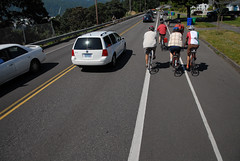
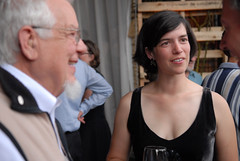
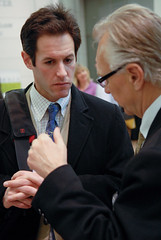
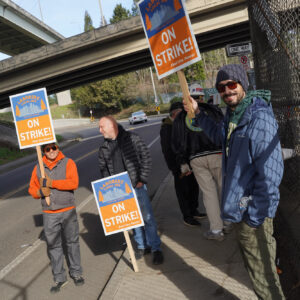


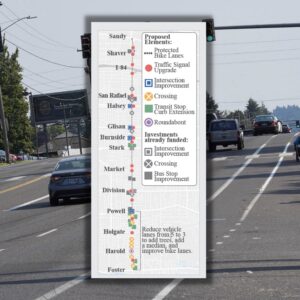
Thanks for reading.
BikePortland has served this community with independent community journalism since 2005. We rely on subscriptions from readers like you to survive. Your financial support is vital in keeping this valuable resource alive and well.
Please subscribe today to strengthen and expand our work.
I’m really interested to see what they do with the 12th avenue overpass over I-84, as that’s very close to me, and I use that overpass all the time, usually going to/coming from the steel bridge. Honestly, it’d be awesome to see an entire route up to 12th from the steel bridge, including that overpass, really fleshed out with some nice infrastructure (including maybe exempting bikes from traffic signals along Lloyd where there is no way automobile traffic can cross the bike lane?).
There is very little independence in the bike transportation community. It’s a closed upper middle class community looking out for their income.
The BTA never asked their membership to call up their Salem reps like Tina Kotek and Chip Shields to oppose the $4 billion CRC.
Why? Because Tina, Chip, and Sam would cut off the very big money going to all the lucrative bike projects and consultants if suddenly the BTA lap dog started to bite back.
Boy, I could have sworn the article I just read was about ALTA and the City of Portland, not the BTA and the CRC. Maybe I just need to read between the lines a little more closely.
“There is very little independence in the bike transportation community. It’s a closed upper middle class community looking out for their income.”
Fascinating, provocative statement, and one worthy of in-depth investigation. Takers?
Andy #3-
You don’t need to read between the lines. Simply reading the post would be enough. I know there were three paragraphs, so it might have been hard to catch this one-
‘Alta’s project team will re-unite two former Bicycle Transportation Alliance staffers who are now independent consultants after leaving the organization in the past year. Former BTA executive director Scott Bricker and former BTA advocacy manager Michelle Poyourow will work as subcontractors with Alta. Bricker says his newly formed company, Bricker Consulting, along with Poyourow’s Poyourow Consulting, will handle the public outreach and “stakeholder engagement” processes for the projects.’
***Personal attack deleted***
Hi steve, thanks for the comment, but please refrain from name-calling if you can help it. Cheers — Jonathan.
One important point to keep in mind regarding 12th ave is this.
Since moving to inner northeast Portalnd I’ve tried the MLK crossing, the 12th Ave crossing, the 21st ave crossing, and the 28th ave crossing. Here’s what I’ve discovered:
The MLK crossing is a busy 4 lane road in each direction with highway onramps and a big enough elevation change to make it easy to flow with traffic southbound, but very difficult to travel northbound (not to mention streetcar track construction).
The 12th crossing is not bad but has no bike lane on the bridge itself and in addition the connection between Tillamook and Broadway to the bridge has stoplights at every block which slows down travel significantly. The 28th crossing is okay if you can manage the S-curve but it’s out of the way for most inner eastsiders.
My favorate of late has been 21st which has a bike lane along it’s whole length. The problem of the double stoplight at Broadway and Weidler as well as the pool design btwn Weidler and Multnomah can be avoided by taking 19th ave between Multnomah and Broadway. What is really needed is a bike (and maybe transit too) bridge at 7th or 9th ave. But of course there’s never any $$ for that
re comment 6, the lanes on the 12th street overpass are too narrow to safely include a striped bike lane, and striping a lane would only exacerbate the problem at the north end of the bridge, where cyclists need to position themselves in the left lane to turn left and in the center of the right lane to proceed north on 13th without getting right hooked. the striped lane on 21st over the bridge has the effect of pushing bike traffic rather farther to the right than a vehicular cyclist would choose to ride. to get to 19th requires a left across oncoming traffic. what is needed in both these cases are sharrows.
footnote: PBoT has indicated that it intends at some point to convert the sidewalks on 12th over the bridge to MUPs. when i heard roger geller say this at a BAC meeting, i asked whether this would be a mandatory sidepath, or whether bikes would still be permitted to use the deck (for the positioning purposes mentioned in my previous post), and he agreed that sharrows would be appropriate. we will see what actually gets put on the pavement.
I’d been wondering what Michelle and Scott were up to post-BTA! Glad to see them starting up their own ventures, and continuing to contribute to local bike infrastructure.
and thank you, jonathan for deleting the offensive language in comment 5.
As The Who so famously sang…
“Meet the new boss. Same as the old boss”
Alta gets the contracts and farms out portions to former BTA staffers and close friends. In other news, water found to be wet!
#2 Joe:
I’m a little conflicted about your comment. While I certainly support your anti-CRC efforts (if you remember, I attended your anti-CRC happy hour for Bob Stacey), and agree that the BTA should do more to resist the CRC, I feel like your criticism seems somewhat misplaced here in an article that is, in part at least, about Michelle Poyourow, who has been one the most consistent and vocal critics of the CRC. Case in point:
http://bikeportland.org/2009/08/31/bta-walks-away-from-crc-bikeped-advisory-process-we-will-put-our-energy-elsewhere/
At CRC hearings and protests, Michelle’s stood out as a strong, clear voice in the face of what otherwise appeared to be an unstoppable steamroller of a project.
I’m less aware of Mia and Scott’s stance on the CRC, but I get the sense that Mia isn’t a huge fan based on a comment in this post about Rex Burkholder’s campaign:
http://bikeportland.org/2010/04/09/checking-in-on-the-race-for-metro-president/#comment-1529851
While I myself voted a different way, I’d say “blemish” – while an understatement – is an apt description.
I guess what I’m saying is that while I’m all for anti-CRC criticism, I don’t see how it fits here in the comments section of this particular story, directed at these particular people.
If they were so good at their jobs, wouldn’t they still be at the BTA? The whole BTA change over smells fishy.
“If successful, Birk says, Alta’s work will develop the projects up to the point where PBOT can then fund them and begin implementation.”
I totally love that line. The city is spending money for a plan, if successful, to raise more money and then spend money.
Let me clarify, I think Michelle does a wonderful job and thats why she was hired so quickly for this job. I can’t figure out the BTA axed her?
Unless the BTA wants us to beleive alta hires unqualified staff…
@JE #12: Better that than spending our money without a plan.
Plans aren’t free. Good planning is worth every penny.
my recollection is michelle quit
My memory is the same as #17.
However, I tend to agree with my buddy Joe Rowe that Portland’s bike advocacy community is incredibly insular.
This is one hope I have for the BTA’s new director, as he comes from a larger organization in a larger city with a broader mandate. I’m really hoping he can reach out to non-wonks in a way that the BTA has had trouble doing in the past, as well as linking up with other organizations working on different-yet-related issues (like Michelle did to join with CLF, AORTA, etc., in opposing the CRC).
But to link this all back to what I was originally going to post, when I read the headline, my first reaction was “surprise of the century.”
Is there even another bike infrastructure planning firm in town? You’d never know it.
The industry I work in (not the bike industry) is also insular. There are several “main player” companies scattered across the United States, and there are many people who have worked for one or more of them, and everyone seems knows everyone else.
I don’t think it’s necessarily a bad thing, it’s just what happens when there are a limited number of players. There is also a lot of industry-specific knowledge that is gained while working in my industry that makes it less likely for new folks to get involved and more likely that people make a career out of it.
I don’t think you can fault former BTA members for becoming/staying involved in an industry they know very well.
It also follows along with the old saying: “it’s who you know”. I’ve held three jobs over the last 9 years, and for two of them, I was able to skip the formal “interview” and turn in a resume as an afterthought basically, because I knew people in charge. Doesn’t make me a bad worker or someone trying to game the system. If you see an opportunity, TAKE IT.
Reply to #12: If you remember, the BTA would not come out against a 12 lane CRC for months and months- while the cycling community was demanding a stop to the mega-bridge madness. Eventually, a limp, weak, soft stance was offered. See below.
http://bikeportland.org/2008/05/21/bta-at-a-crossroads-with-columbia-river-crossing-project/
As a vehicular cyclist who nonetheless believes that dedicated cycling infrastructure is required to increase cycling mode share to any significant extent, I am puzzled as to what good a MUP would do on 12th. If positioning oneself in the correct lane is required to make the connection, why provide the MUP? If the MUP is satisfactory, why allow for sharrows? This is one case where half-measures provide confusing and contradictory messages to intended users. (And don’t get me started about MUP’s: forcing cyclists and pedestrians in the same inadequate space!)
My apologies for my initial snarky comment – and the flamewar it helped set off.
However, I do not think this article is the appropriate place to complain about BTA advocacy with regards to the CRC, particularly when the two people referenced in the article no longer work there. This is a different project, with a very different scope, budget and client. The people in question are in different roles than at their previous employer, with different responsibilities for their job. Who knows, maybe it’ll suit them better.
Ahhh, good ol Portland cronyism.
Glad to see you playing your part Jonathan!
City awards pointless and wasteful contract to a local firm full of political insiders.
‘If successful, Birk says, Alta’s work will develop the projects up to the point where PBOT can then fund them and begin implementation.’
Boy, what great news. Good thing PBOT doesn’t simply do this themselves, what would Mia, Scotty, and Michelle do for a living?
Alta then doles out even more pointless and wasteful contracts to their friends, Michelle and Scotty.
‘Bricker says his newly formed company, Bricker Consulting, along with Poyourow’s Poyourow Consulting, will handle the public outreach and “stakeholder engagement” processes for the projects.’
Good thing Alta doesn’t simply do this themselves, what would Scotty and Michelle do for a living?
“stakeholder engagement processes” Sounds important.
“public outreach processes” Whew, I bet that is reaally important.
Thanks for letting us know how much this ‘exciting’ development is going to cost us all Jonathan…
Jonathan then dutifully reports this wasteful mess as- ‘exciting projects’ and relays how Mia is just ‘thrilled’ to have been ‘selected’. As if there was ever any doubt. What a farce.
This type of nonsense is part of the reason funds are scarce for cycling infrastructure. There is an insular group of politically aligned insiders sharing public dollars with themselves and their friends at our expense.
Oh that we had some sort of Portland based cycling news site that would research this type of graft. Instead of dutifully relaying it to us with a smile.
This type of nonsense is an outrage.
For further reading, here is the type of thing we never see reported on this site-
http://citywatchla.com/index.php?option=com_content&task=view&id=3633
And yes, Alta and Mia were a big part of this mess.
#20, Anon:
I think you have a valid point with regards to the BTA and the CRC. But I think andy in comment #22 just put it best:
steve,
thanks for the link and for your comment. if you have any evidence of anything you mention in your comment I’d be happy to talk with you further and consider a story.
your passion and emotion is obvious, but I think you’d have a lot more credibility if you actually took time to think about what you’ve written.
your allegations about me are completely false and w/o any merit whatsoever. The irony of your comment is that I published this story in large part to inform the community that Alta and Bricker and Poyourow had gotten the contract. Do you realize you would not have known that fact without my report?
As for the LA sharrows example. Are you kidding? Do you really think I wouldn’t report on something like that if it happened in Portland?
A few other things…
— Yes, these are exciting projects.
— I asked PBOT for dollar figures involved in this contract but there are none yet because negotiations are just beginning.
— And yes, public engagement is really important (although I think PBOT does an awful lot of it!).
Thanks again for your comment.
I’m just going to cut and paste my comment from the Bike Commuter Tolerance guest article from last Thursday, as I’m guessing Jonathan didn’t see it:
—————
Hey Jonathan, regarding your comment (#2), maybe it’s time for that 7th Ave bike/ped bridge article? 🙂
Solutions have been proposed for making close-in N/S connections easier and safer; they just haven’t been followed up on.
I still maintain that a bike/ped bridge over 84 at 7th would be a wise investment in infrastructure. For all of us, but particularly in terms of creating a better connection in that area for the nervous-but-interested and people with kids.
———————
I really hope that Alta is allowed/encouraged to explore the long-proposed 7th Ave bridge option as an alternative (more costly, yes, but with much greater benefits as well) to what sounds likely to be a crappy pseudo-solution to the 12th overcrossing…
I think this is going to be one jaw-dropping superteam that shall bring extreme justice and glory for all. Chiblam Chiblooey!
I would say that public outreach is a critical element, considering some of the public “outrage” over the Holgate buffered bike lane.
re comment 23, yeah, it’s way groovy to be a self-employed independent consultant, ‘cos you get to pay your own payroll taxes and you get to try to find health coverage without a group. if the same 185k was spent in-house at PBoT the efficiencies would be exactly what? you don’t want stakeholder engagement or public outreach? i mean, what exactly are you saying?
Jonathan re #25
“I asked PBOT for dollar figures involved in this contract but there are none yet because negotiations are just beginning.”
Do you mean to say that the city has already awarded the contract without knowing the cost?
JE #30: “Do you mean to say that the city has already awarded the contract without knowing the cost?”
No JE, Jonathan means the city said numbers aren’t final yet.
Typically once a consultant wins a contract, the consultant and client go through another round of negotiation to specify the exact products to be delivered and fees to be paid. Alta and the city assuredly have a working understanding about what will be done and how much it will cost; during this next phase they will spell out the details of it. If the two parties can’t come to an agreement on the specifics, the city can withdraw the offer to Alta and restart the contracting process.
Considering that Alta has opened branches in several places and that they are becoming one of the Big players in the Transportation Planning Industry (I made that up but maybe it’s a real thing, who knows?), the likelihood of not agreeing on specifics for a contract that was already awarded on a budget that is as yet unclear — well, I doubt that Alta and the city would drop the whole thing now.
There seem to be a lot of steps to this dance and I don’t yet feel convinced that all of them — or all of the players — are absolutely necessary.
how about some amsterdam-style bicycle traffic signals where the bike blvds cross major auto arterials? i’m thinking in particular of where bike blvds cross MLK & Grand, most of which have no traffic signals whatsoever.
Lisa P (#13) – Scott Bricker is a great lobbyist, and I suspect a pretty good consultant. Michelle Poyourow will be good as a consultant as well, she has an amazing depth and breadth of knowledge and the drive to turn it into a solid business. Ability has nothing to do with why they are no longer at the BTA.
The BTA is a complex entity, and at any given time there are at least 25 staff, board members, and primary stakeholders. In any organization that size, it’s impossible to simply state what the challenges are with the organization. The BTA frequently gets my criticism on many items, but also my praise when they do things right – which they do frequently. While I disagree with a number of the staff changes, sometimes those changes happen simply because the chemistry of the staff isn’t working – and some changes are simpler than others. Some have more impact than others. Bringing Sadowsky on board was not an easy decision for the board, and I think it was a good one, but I also think that the board made a big mistake taking Scott Bricker away from what he is good at (lobbying) and forcing him to divert that energy to the administration and fundraising of the organization. I think they missed an excellent opportunity to push the legislative agenda when all of the relationships Bricker built had to be reworked with Karl Rohde in that slot.
There are no simple answers, and it’s easy for people to point fingers at people we know casually, if at all on a personal level. (“people” in a general sense, not you specifically)
That said, I agree with other commentors that Joe Rowe has a point – the community is very insular. On the flip side, the community is going to go with those who have the knowledge, the drive, and the skills, and you get that by volunteering, working as staff, or serving on a board of an organization that does this type of work, whether in public or private practice. Bricker, Poyourow, Mia Birk and others each have a number of years of specific experience with bike infrastructure. Anyone from outside the bike planning “community” in Portland has to have enough skill to offset the local knowledge these individuals possess, or we’re (society) not putting the best people in those jobs.
steve (#23) “Good thing PBOT doesn’t simply do this themselves” – this displays an ignorance of city departments. City staff already is engaged 100% with their assigned duties. They don’t have the time, skills or resources generally to also engage in fundraising, which utilizes a different skillset than most of the staff has. Hiring a firm to identify and help secure funding is generally cheaper, since the city doesn’t have to pay Alta benefits, or retirement.
It’s not all a conspiracy as you seem to imply.
BTW, the article you cite doesn’t show that Alta made the mistake in recommended placement of the sharrows – I wouldn’t call name dropping “investigative journalism”.
Actually, I think Steve makes some pretty good points.
I found the commentary on this story to be very interesting, as it seems there are a number of people not too impressed with the work Alta is doing.
Alta is probably the biggest consulting firm specializing in bicycle and pedestrian planning in the nation and is well respected in the field and by myself. There are two or three other (relatively) large firms that specialize in bike/ped planning and several others that have strong bike/ped departments. Overall I think there are only 10 firms that have more than 8 people on staff working exclusively or mostly on bike/ped planning issues. There are probably only 2 or 3 cities that have 8 or more staff members working these planning issues as well.
As a professional in the bike/ped planning field, I too am concerned that the profession is becoming too insular on some topics and that a feedback loop of self approval may be forming in the profession, particularly in the past 3 to 4 years. I have little concern with most of the ideas and design innovations that have been developed in that time but there are two or three treatments that have become popular solutions that I have a real problem with since they grossly violate some basic roadway behavior principles.
Unfortunately, I feel that my concerns about these innovations are dismissed and under the “Safety in Numbers” rug and (ie. it’s okay to build infrastructure with inherent flaws because the safety in numbers principle will make it okay in the end).
Finally Portlanders, don’t get too spoiled out there. At least you have one of the best bike/ped consulting firms at your fingertips. I’m quite sure there are hundreds if not thousands of bike/ped advocates elsewhere in the country who would love to have your problems.
Best of luck!
some thoughts on perspective.
steve-since i do not know you personally i’ll defer to matters that i have first person interactions and knowledge of.
in general terms you speak of cronyistm and an insular community. vocal advocates of cycling are a considerably small group here in portland. (please forgive the fact that i live north of the columbia in vancopuver). those that can garner the attention of policymkers are an even rarified lot. the well is shallow and the cream rises to the top. can you figure out the mixing of metaphores? both scott and michelle are stellar advocetes for cycling issues. personally i do not agree fully with either’s stance but recognize their contributions and value to our community. any cyclist would be hard pressed to think they are not assets rather than liabilities. both seem to have the drive to make effective change. is that what is needed? although i have never met scott i do know michelle (figuratively speaking)through a few conversations as just folks, regular people. from my point of view she’s smart, articulate and passionate about the issues we as cyclists all hold dear. yeah our perstective may differ but i do strongly endorse and want folks like her speaking for the community in which i am involve with.
#18 “Is there even another bike infrastructure planning firm in town? You’d never know it.” From what I hear, the answer is “Yes.” Apparently another firm was a very close second for this project, which is good to hear. Nothing against Alta, but some competition of ideas should create more options.
BURR (#35) – the points are somewhat buried in the sarcasm, and I don’t see them the same way. I agree with Anon (#36), that the local planning community seems to be getting a little insular. Even Alta has shelled out some questionable recommendations on some projects, though I don’t know how much of that is Alta, and how much is due to the constraints put on the project by the originator. Any planner has to work within the constraints of the project, and if those constraints are too restrictive, well… start with crap, get crap results.
DKS Associates has some great planners on their staff also, and they’ve done really great work with the City of Milwaukie.
There are still a lot of projects out there that are poorly designed for cyclists (Clackamas Town Center’s MUP on Sunnyside, for example), and some treatments, like curb extensions, make cycling more difficult since they restrict cyclist movement and create pinch points with auto traffic. These “improvements” are being promoted by municipalities at the local and state level, and by planning firms including Alta Planning. And I’m fairly sure a number of projects are never ridden or walked by the planners who “fix” them.
Not trying to discount their efforts – Alta, Cogen Owens Cogen, DKS and other firms do some really great work, but they’re not perfect, and they bear little or no liability for bad design. (and thus, there is no external drive to get it right, only a drive to “get it the way the customer wants”) Perhaps that’s the biggest problem, since there is nothing in the system to encourage the project implementers to do what is right over what is convenient.
Can’t they just go put up cones one day then change them around according to surveys of passing cyclists? It’s not rocket science to paint a thick white line or paint a sharrow. On the other hand, the Couch St couplet…ugh.
Maybe that left-hand rider in the top picture should pay more attention to riding in his lane since he has one to ride in. If that minivan rode proportionally close to the line I bet he’d be pissed. Just sayin.
he is in the lane, which is all that is required. the overtaking station wagon is not encroaching, which is unfortunately all that is required. the safe passing distance statute, 811.065, does not apply where there is a bike lane, meaning the motorist could, as you suggest, ride a close to the line as she chose. a cyclist riding toward the left edge of the bike lane could be working a strategy to force motorists to keep their distance. i know that is why i do it.
This is a case of when “activists” like Michelle and Scott embrace the worst parts of the establishment they should be reforming.
The reward is noted here. They leave staff positions in non profits and climb the ladder to big money from contracts with their friends in the establishment.
While at the BTA both Michelle and Scott did a great job of fooling the bike community about the CRC. They spread rumors this project was dead, or dying. They were very limited in their action to stop the CRC. They had some strong words at times, but little action.
Fast forward to this week. Another $42 million was just spent to plan this bridge.
http://blog.oregonlive.com/commuting/2010/07/sen_murray_gets_42_million_for.html
Here’s a photo of the top salesman of the $5 billion CRC: Rex Burkholder with Michelle. Rex is very close with Michelle, Scott, and the CEO and staff of Alta.
http://www.flickr.com/photos/freddy/2390692112/
Not everyone might like the news, nor the messenger.
Jonathan, the first Stakeholders Advisory Council meeting is tomorrow (Thursday) Dec 9th at 7:30am (ouch!) at 700 NE Multnomah Building, 3rd Floor Conference room (same floor as the Lloyd TMA).
glad you made it